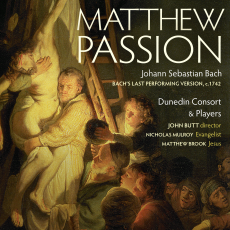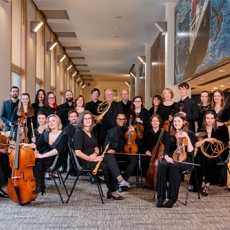JS Bach Matthew Passion - Dunedin Consort - MusicWeb International
This wonderful new recording of the St Matthew Passion is the first to adopt Bach's final revisions to the score as performed in 1742. Most casual listeners may not be able to identify the departure in scoring from the most commonly performed 1736 version: which amounts to the replacement of organ with harpsichord in the second orchestra, and an additional viola da gamba in a recitative and aria. However, where this recording really stands out is in the size of the vocal forces. A total of eight singers are employed, therefore providing just four voices for each of the two choirs. This arrangement clearly has potential disadvantages for those of us raised on the full chorus monumental direction from the likes of Richter and Klemperer. On the other hand, and as John Butt points out in his informative essay, there might be an aesthetic advantage in hearing the voices ‘as individuals constituting a group rather than simply as a crowd'.
John Butt is one of our foremost authorities on Bach and historically informed performance more generally, and a great deal of intellectual vigour has undoubtedly been applied to this project. However, whether one agrees on principle with the veracity of one-to-a-part performance practice adopted here (I don't), on purely aesthetic terms it simply doesn't matter. The performance is a triumph from start to finish, immeasurably assisted by the usual superb, spacious and crystal clear engineering by Linn Records.
The most obvious comparison recording is that of Paul McCreesh with the Gabrieli Consort [DG Archiv 474 200-2], which also adopted the one-to-a-part approach. That important recording was graced with several highly regarded and established soloists, including Magdalena Kozena, James Gilchrist and Mark Padmore. Overall, Butt's vocal forces cannot quite compete at the same technical level - yet, somehow this doesn't matter. The total experience transcends the sum of its parts, and if the individual peaks cannot match the likes of Dietrich Henschel in Mache dich, mein Herze, rein under Harnoncourt or Michael Chance in Erbarme dich, mein Gott under Gardiner, they come very close. In particular, Nicholas Mulroy shows outstanding emotional flexibility as the Evangelist and Clare Wilkinson's contribution is also highly expressive throughout.
The smaller forces employed in this performance provide a level of intimacy and immediacy that I don't think exists in any other available recording - including McCreesh. Butt's pacing is beautifully judged, never seeming rushed; to my ears, many ‘historically informed' recordings suffer from overly swift tempos. The Dunedin Consort also plays magnificently, supporting the drama of the Passion with clean and colourful expression which is constantly involving.
There is no single recording of the Matthew Passion to rate above all others, but this one is very special indeed - and an essential alternative to the large-scale, full chorus offerings of the past.

